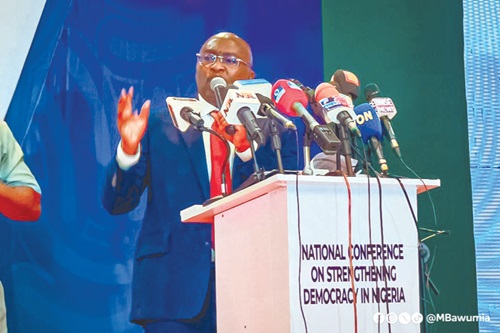Ghana’s former Vice-President, Dr Mahamudu Bawumia was the keynote speaker at a national conference on strengthening democracy in Nigeria this week.
The speech, not only brilliant in substance, raised critical questions for reflection as African countries search for ways to strengthen and consolidate their democracies.
Here are some key points of what African citizens have said in the Afrobarometer survey which reinforces the salient points raised by the former Vice-President.
I draw on data primarily from the Afrobarometer survey Round 9 (2021-2023) which covered 39 countries.
Although Round 10 (2024-2025) surveys are currently underway and completed for some, data is only publicly available for 20 countries.
The limitation of coverage (number of countries) makes it more appropriate to use data from Round 9.
Africans support democracy, acknowledge the problems and are dissatisfied
Let’s begin first by examining the extent to which there is popular support for democracy. Across the 39 countries, 66 per cent say, “democracy is preferable to any other form of government.”
There is wide variation across the region with support for democracy ranging between 39 and 87 per cent.
Second, when asked about the extent of democracy, the predominant response category breaks down as follows – a democracy, but with major problems (22 countries); a democracy, but with minor problems (15 countries) and not a democracy (2 countries).
As a collective, citizens said the following – not a democracy (18 per cent), a democracy, but with major problems (35 per cent), a democracy, but with minor problems (31 per cent) and a full democracy (16 per cent).
Third, Africans are very dissatisfied with the way democracy works. Overall, only 37 per cent expressed being “fairly satisfied/very satisfied.”
The level of satisfaction ranges between seven per cent and 56 per cent across 37 countries.
There are two exceptions where the level of satisfaction is very high – Zambia (71 per cent) and Tanzania (80 per cent).
The crisis of confidence in institutions
Dr Bawumia asserted and rightly so, that - “one of the most important determinants of a flourishing democracy is the quality of institutions. Institutions capable of guaranteeing rights, including property rights and checking the wanton abuse of power.”
Several important bedrocks ensure the building of quality institutions, two of which I highlight – trust reposed in them by citizens and the absence of corruption. On this score, African countries cannot boast of having quality institutions critical for the “flourishing of democracy.”
Consider the following examples and the percentage of citizens who express “a lot” of trust in institutions – Parliament (14 per cent), National Electoral Commission (17 per cent), courts of law (22 per cent), police (23 per cent) and elected local government council (16 per cent).
This level of trust is extremely worrying when one considers the role these institutions are designed to play in any country’s democratic architecture.
The crisis of confidence in institutions is further compounded by citizens’ perception of the extent of institutional corruption. Consider the following institutions and the percentage of citizens who say “many/all” of the persons associated with them are involved in corruption – Office of the President (38 per cent); members of Parliament (36 per cent), civil servants (38 per cent), elected local government councillors (31 per cent), police (46 per cent), judges and magistrates (35 per cent) and elected local government council (16 per cent).
The missing democracy dividends
Dr Bawumia could not have described the essential purpose of democracy any better than when he asserted the following – “the best democracy is the one that delivers public goods and services effectively and efficiently and creates opportunities for citizens whilst making conscious efforts to leave no one behind.”
This reflected an earlier part of the speech in which he touched on the need to “grow a democratic culture that is resilient enough to deliver governance, economic and social dividends to citizens.”
In the opinion of citizens on the continent, the democratic dividends (governance, economic and social outcomes) are largely missing.
When asked how well the central government is handling several important issues, the percentage who answered “fairly well/very well” are as follows – managing the economy (27 per cent), improving the living standards of the poor (22 per cent), creating jobs (20 per cent) and fighting corruption (29 per cent).
The evaluation of citizens is slightly better in a few other places – addressing education needs (46 per cent), improving basic health services (41 per cent) and providing water and sanitation services (38 per cent).
Conclusion – Are Africans searching for non-democratic alternatives?
Dr Bawumia discusses well the challenges and threats to democracy in the region.
Are Africans searching for non-democratic alternatives?
At this point, I believe the answer is “no,” notwithstanding the successful military coups seen over the last few years.
Africans continue to reject non-democratic forms of government - one party rule (78 per cent), one man rule (80 per cent) and military rule (66 per cent).
Again, there are variations across countries but the collective sentiment is not pro nondemocratic forms of government.
The speech must spur us into action because we cannot afford the luxury of watching the “threats” to democracy unattended.
We must work hard to change the trajectory.
The writer is the Project Director, Democracy Project

